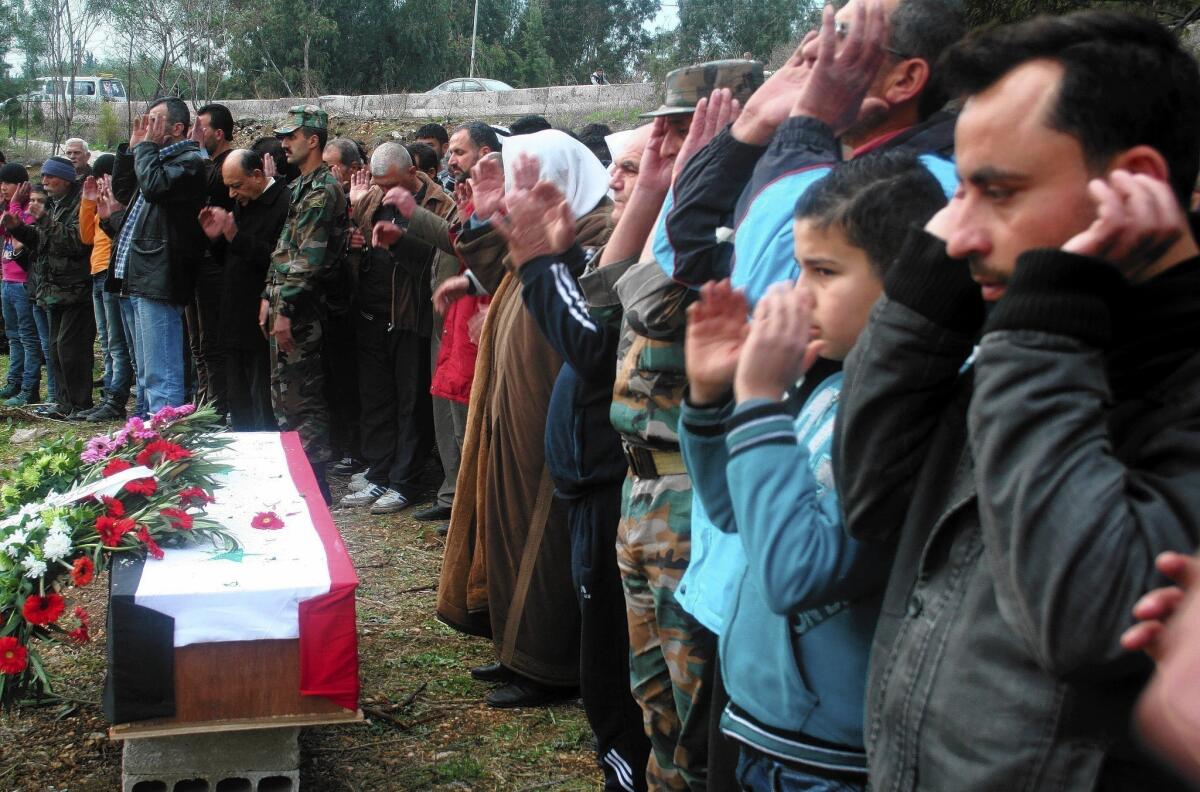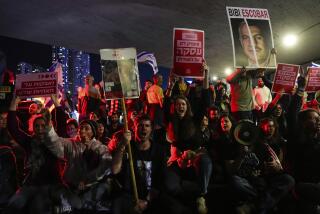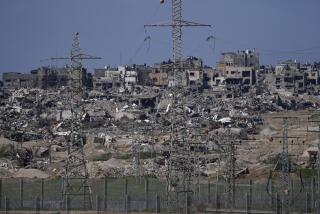Syria proposes cease-fire ahead of peace talks

BEIRUT — With the U.S.-backed opposition mired in disputes, Syria’s government on Friday proposed a limited cease-fire, a prisoner swap and measures to speed aid to civilians in a move that appeared aimed at ensuring it is an indispensable part of any effort to end the civil war.
The diplomatic initiative outlined in Moscow by Syrian Foreign Minister Walid Moallem and his Russian counterpart, Sergei Lavrov, came just five days before the start of United Nations-sponsored peace negotiations.
U.S. Secretary of State John F. Kerry expressed skepticism about the Russian-Syrian plan, lashing out at the “revisionism of the Syrian regime” and telling reporters in Washington, “Nobody is going to be fooled.”
The U.S.-backed opposition, however, hasn’t even been able to decide yet whether to attend the peace conference in Montreux, Switzerland. Senior leaders met Friday in Istanbul to decide who, if anyone, would represent President Bashar Assad’s foes, but hours of behind-the-scenes debate produced no clear resolution.
Some commanders of rebel forces in Syria consider taking part in peace talks with Assad’s government treasonous.
Under Moscow’s guidance, the Syrian government seems determined to occupy the diplomatic terrain ceded by the fractious opposition and make Assad’s continued presence essential to any peace deal that might emerge from the so-called Geneva II talks. Washington and the U.S.-backed opposition groups insist that the negotiations must result in the ouster of Assad and the end of his family’s more than four-decade rule.
The Kremlin, a key backer of Assad, appears intent on pulling off the kind of diplomatic maneuver that last year helped avert U.S. airstrikes in exchange for Assad’s decision to renounce his chemical weapons program.
This time, the Syrian government is putting forth exactly the confidence-building proposals — a limited cease-fire, a prisoner swap, increased humanitarian aid — that Kerry has been calling for in recent days.
In September, when Kerry suggested in an off-the-cuff comment that Syria could avert U.S. airstrikes by giving up its chemical stockpiles, Russia prodded Syria to do just that.
In the run-up to the talks in Switzerland, Russia and Syria are presenting the Assad government as an alternative to the turmoil and mayhem that has overtaken rebel-held areas. The two allies are clearly trying to appeal to Washington’s fear that Syria has become a latter-day Afghanistan, a breeding ground for Islamic militants from across the globe and Al Qaeda suicide bombers in the heart of the Middle East.
“We want this upcoming conference to put an end to the bloodshed and ensure that Syria does not become a hotbed of terrorism,” Lavrov said in Moscow at a news conference with Moallem.
Syrian officials are seeking to shift the focus of the peace talks from forming a post-Assad transitional government to combating the terrorist threat emanating from the country. The government has never explicitly endorsed the transitional governing blueprint and said in a letter to the U.N. this week that some aspects of the talks were in conflict with Syria’s political and legal tenets.
U.S. officials, keen to assuage their allies in the Syrian opposition, are pushing to move the focus back to replacing Assad.
“He’s been doing this for months, trying to make himself the protector of Syria against extremists,” Kerry told reporters Friday in Washington, referring to Assad. “It will become clear that there is no political solution whatsoever if Assad is not discussing a transition and if he thinks he’s going to be part of that future.... It’s not going to happen.”
The Obama administration’s top diplomat even hinted that the United States could be contemplating additional punitive action in Syria should government negotiators block progress toward creating a transitional governing authority. Assad “will invite greater response in various ways from various people over a period of time,” Kerry warned obliquely.
But the administration has tried hard not to get dragged too deeply into the war, and it was unclear what kind of steps it would be willing to take.
U.S. officials and their allies say Assad is responsible for the emerging terrorist threat, having ruthlessly repressed peaceful protests when unrest broke out almost three years ago. On Friday, Kerry alleged that Assad was funding “extremists” and was ceding territory to militants “to make them more of a problem so he can make the argument that he is somehow the protector against them.”
Many Syrians, especially Christians and other minorities, have come to view Assad’s government as a bulwark against militants whose views are counter to the tolerant brand of Islam long practiced in Syria. Assad accuses the United States and its allies of arming and funding militants in a “conspiracy” to break Syria’s long-standing alliance with Iran and Hezbollah, the Lebanese-based political and paramilitary group.
The Syrian government says it will attend the Geneva talks. But it has insisted that Assad will not agree to resign, and might even consider running for reelection this year.
The prospect of face-to-face negotiations with the Syrian administration has put the U.S.-backed Syrian National Coalition, the major opposition political grouping, in a deep quandary. Many rebel commanders in Syria have denounced the talks as a sellout to Assad’s government. The exile-based coalition, already assailed by many rebel forces as ineffective, will face additional criticism from rebel groups if it joins the talks.
On Friday, Moallem said his government was prepared to implement a cease-fire in the northern city of Aleppo, which has been divided between government and rebel forces for 18 months. In recent weeks, the city has also been the site of intense fighting between various Islamist rebel groups, including several Al Qaeda-linked factions. How a cease-fire would be achieved in the embattled city isn’t clear, but Moallem spoke in Moscow of a “zero hour” in which hostilities could cease, presumably before the peace talks.
Previous efforts to impose large-scale cease-fires have failed during the war, which has killed more than 100,000 people. Some localized cease-fires have held, however, after negotiations between government and opposition representatives.
The Syrian government also said it was willing to step up efforts to bolster the delivery of humanitarian assistance, but it accused rebels of opening fire this week on an aid convoy destined for civilians trapped in the besieged district of Yarmouk, in the southern part of Damascus, the capital. The opposition blamed the government for the failure to provide aid to the thousands of residents there.
In addition, Moallem said Damascus was willing to exchange lists of detainees with the opposition for a possible prisoner swap. The opposition has demanded a release of all detainees.
The Syrian war has spread instability throughout the region, sent millions of refugees streaming across Syria’s borders and created a humanitarian catastrophe in the strategically situated nation, which borders Israel, Iraq, Turkey, Lebanon and Jordan. Syria has also become a focus for Al Qaeda-linked terrorist factions.
More to Read
Start your day right
Sign up for Essential California for news, features and recommendations from the L.A. Times and beyond in your inbox six days a week.
You may occasionally receive promotional content from the Los Angeles Times.






